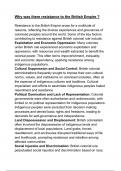Why was there resistance to the British Empire ?
Resistance to the British Empire arose for a multitude of
reasons, reflecting the diverse experiences and grievances of
colonised peoples around the world. Some of the key factors
contributing to resistance against British colonial rule include:
Exploitation and Economic Oppression: Many colonies
under British rule experienced economic exploitation and
oppression, with resources and wealth extracted to benefit the
colonial power. This often led to impoverishment, inequality,
and economic dependency, sparking resistance among
indigenous populations.
Cultural Suppression and Social Control: British colonial
administrations frequently sought to impose their own cultural
norms, values, and institutions on colonised societies, often at
the expense of indigenous cultures and traditions. Cultural
imperialism and efforts to assimilate indigenous peoples fueled
resentment and resistance.
Political Domination and Lack of Representation: Colonial
governments were often authoritarian and undemocratic, with
limited or no political representation for indigenous populations.
Indigenous peoples were excluded from decision-making
processes and denied basic rights and freedoms, leading to
demands for self-governance and independence.
Land Dispossession and Displacement: British colonialism
often involved the dispossession of indigenous lands and
displacement of local populations. Land grabs, forced
resettlement, and enclosures disrupted traditional ways of life
and livelihoods, prompting resistance and rebellion among
affected communities.
Social Injustice and Discrimination: British colonial rule
perpetuated social injustice and discrimination based on race,
, ethnicity, and class. Indigenous peoples were subjected to
discriminatory laws, policies, and practices that reinforced racial
hierarchies and marginalised non-European communities,
fueling grievances and resistance.
Nationalist Aspirations and Identity: The rise of nationalist
movements and aspirations for self-determination played a
significant role in resistance against British colonialism.
Indigenous peoples sought to assert their own national
identities, reclaim control over their destinies, and challenge the
legitimacy of colonial rule.
Active Resistance and Rebellion: Colonised peoples actively
resisted British colonial rule through various forms of
resistance, including armed rebellion, guerrilla warfare, civil
disobedience, protests, strikes, and boycotts. These resistance
movements sought to reclaim sovereignty, autonomy, and
dignity, and ultimately contributed to the dismantling of the
British Empire.
In summary, resistance to the British Empire was driven by a
complex interplay of economic exploitation, cultural
suppression, political domination, social injustice, nationalist
aspirations, and active resistance. Colonised peoples across
the globe fought against British colonial rule in pursuit of
freedom, justice, and self-determination.
The British Empire
India
The British first became involved in India through trade. The
East India Company (EIC) was set up in 1600 and it bought
and sold exotic silks and spices for example.




